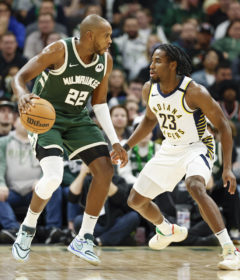Calinger: Patriots act guilty, deflect responsibility

By J.W. CALINGER
ISL Correspondent
The ongoing discussion about the New England Patriots, regarding proven and alleged instances of cheating, is a fascinating psychological study with valuable insights into the way people act when accused of wrongdoing.

Everyone from individuals to national governments have said exactly the same things as the Pats and their fans when caught, or accused of, doing something crooked, and I think the main reason people are so suspicious of them is the way so many of their statements match those of parties who have done something wrong, but who want to evade the consequences. This is to say that even if they are innocent, their behavior patterns, and those of their fans, match those of the guilty. To wit:
* “You’re just being whiners.”
Though the Patriots themselves haven’t accused people of complaining, many of their fans have. Throughout this entire saga, comments and memes on social media refer to giving tissues and diapers to those who accuse New England of cheating, either by deflating footballs, interfering with radio signals, spying on defensive signals, or other instances of rule-breaking.
I call this tactic the “Appeal to the Gonads”, and it’s a common tactic of bullies. The idea is that one turns the tables by stating that an adult tolerates harm without complaining and, consequently, anyone who complains about being harmed or seeks a remedy is not an adult. It’s a simple and effective way to turn the tables on accusers, and it’s why many coaches and players, who are in a very macho environment, will not be too terribly vocal about being encroached upon. Naturally, commentators, many of whom used to be players and coaches, also will downplay the issue.
* “You’re beating a dead horse. Get over it!”
Often enough, someone accused of wrongdoing will ignore the complaints until someone has voiced them a certain number of times, and then, similarly to the way one accuses the accusers of whining, will turn the tables by criticizing the way the accusers bring up the issue so often. It’s similar to the way people who owe money will criticize bill collectors for calling them repeatedly about debts they legitimately owe, or how supporters of politicians will treat those who ask about those politicians’ involvement in one scandal or another. The goal is to have the accusers give up and move on.
* “What we did wasn’t really all that wrong.”/”Everybody’s doing it.”
This can get into more of a gray area. We understand that some rules are there more for political reasons than for the actual integrity of the game, and in any environment, many of us can agree that not all instances of rule-breaking are equal.
For instance, rules against steroids and other substances are more to go along with federal and state laws against them. The NFL nominally bans steroids so as not to appear complicit with illegal activity. In actual fact, I think, they generally investigate only in instances where the use is especially obvious. I don’t think they have a problem with the use of substances that make the game harder-hitting. Further, I don’t actually blame people who use substances that help them earn a seven-figure salary they probably couldn’t earn doing anything else – they may deserve a penalty, but I don’t hold it against them personally.
Tampering with equipment, though, or committing espionage against other teams is, if nothing else, more frowned upon. I suppose the reason is, that putting substances into one’s own body has an indirect effect on the opposition, whereas the effect of tampering or espionage is more direct. Further, since rules against those acts are not there for political reasons, one cannot argue that breaking them is something customarily expected. One can argue that contractually, teams have the right to equipment that works according to certain specification, and to know whether they are being monitored electronically. Consequently, the argument that “everyone is doing it” doesn’t hold water; the rebuttal is that if everyone is doing it, either everyone should stop, or the NFL should pass rules allowing videotaping of the opposing sidelines.
On a side note, I’m surprised the Patriots couldn’t find someone in the Boston metro area – say, at MIT – with an eidetic memory, whom they could pay to watch and remember the signals, in which case the issue wouldn’t exist.
And, finally:
* “We might be guilty, but for the greater good, we shouldn’t be punished.”
Since ancient times, people who are especially good at their jobs have gone without punishment because they were irreplaceable and indispensable. It started with the first alpha males who might have bullied their fellow cave persons, but without whom the community would have lost fights with their neighbors. It continued with warriors and, eventually, athletes, entertainers, artists, scientists, and politicians. It’s a big part of the reason why college and pro athletes go without punishment for various misdeeds, though in some cases, the tides are turning – the idea that protecting rule-breakers for the good of a tribe of cave persons remains in our minds today, albeit in an adapted form.
The Patriots have been the golden boys of the National Football League since the 2001 season, when a plucky, tenacious, and scrapping team led by a relative nobody – let us remember that Drew Bledsoe was supposed to be the quarterback before he was injured – beat the mighty, unstoppable St. Louis Rams, a 14-point favorite. Through the years, they’ve handled situations like depleted secondaries to win Super Bowls with what looks, on paper, like a dearth of talent – the only constant superstar through the years was Tom Brady and, at Head Coach, Bill Belichick.
I still remember how unsettled the cycling world was when Lance Armstrong was caught cheating during his streak of championships. No doubt, admitting bluntly that the Patriots cheated – assuming for a moment that they are guilty as charged – would case a black eye on the NFL. Commissioner Roger Goodell, et al, may believe that in order to protect the NFL as a whole, it’s necessary to keep the Patriots where they are. While Brady and Belichick themselves may not be indispensable, their public and professed reputations may be, in Goodell’s eyes, and in the eyes of some of the team owners.
***
Fans and supporters of the Patriots do have their points, of course. No doubt, some of the criticism is the result of the envy of a team that has won four Super Bowls since 2001, and has made it to two more – the closest team behind them in the same time span is the Pittsburgh Steelers, who won two Super Bowls and made it to one more.
Still, it’s disturbing that rather than maintaining innocence or apologizing for misdeeds, the team and its fans have employed tactics that remind us so much of those employed by persons or groups who want to evade justice in other walks of life. Psychologically, it’s natural and even reasonable that people should assume that the Patriots and their fans are using the same tactics, for the same reasons. This is the reason that the reputation of New England as cheaters won’t go away any time soon.






